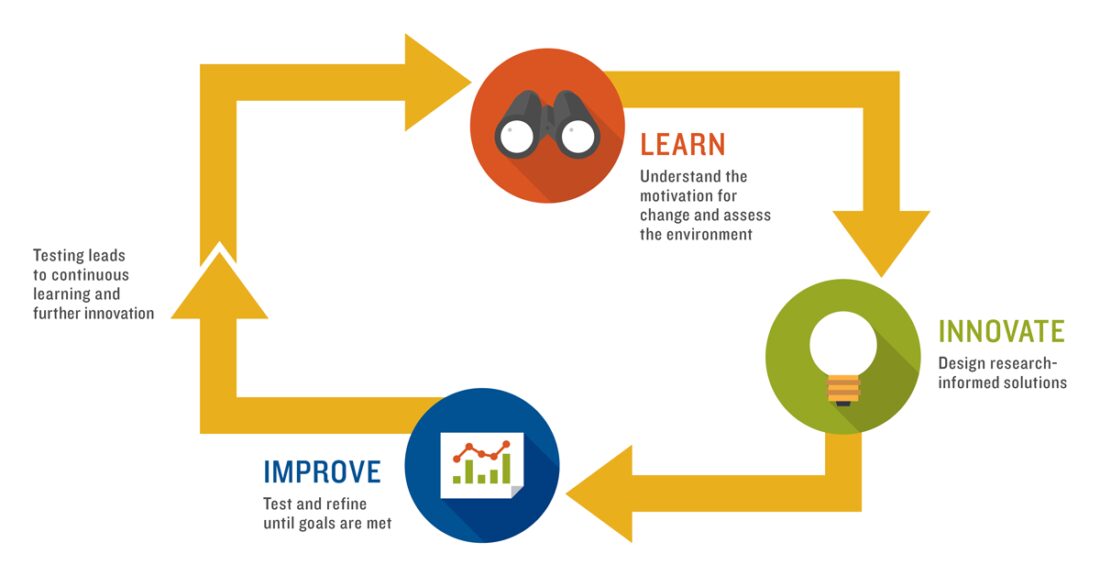Incorporating Equity Into Rapid-Cycle Learning

Championing Change, a new guide from the research organization Mathematica, helps service practitioners use the rapid-cycle learning method to achieve equitable results. The resource, funded by the Annie E. Casey Foundation, incorporates lessons learned from an effort by Agape Child & Family Services, a two-generation service provider in Memphis, Tennessee, to improve two of its programs through small tests of change.
Rapid-cycle learning is an approach to program improvement that allows practitioners to quickly pilot strategies on a small scale — for example, with a few staff members or families — before making changes program- or agency-wide. The speed of testing and adaptation and the low stakes of individual iterations make for an appealing alternative to a long, complex development process for a solution that might fail. Rapid-cycle learning gives service providers the chance to fully understand how solutions work prior to adoption, as well as opportunities to demonstrate success and build buy-in among program leaders and staff, community members and participants.
Download Championing Change
To ensure equitable outcomes that remove barriers for families of color, equity principles must be integrated into rapid-cycle learning from the ground up — with the people most affected by the program involved in shaping all aspects of the work. The guide presents tips and suggestions for conducting a rapid-cycle improvement effort with equity built into each step.
“Because including more diverse voices and accommodating participants’ schedules in a review process can take time, it might seem challenging to incorporate equity into a rapid-cycle improvement process,” says Allison Holmes, a senior research associate at the Casey Foundation. “This guide offers tangible advice to ensure rapid-cycle learning advances equity while maintaining momentum.”
Increasing School Attendance and Connecting Adults to Employment
In 2001, Agape began using a model for supporting parents and children together through a range of programs. Ninety-five percent of participants in these programs are adults and children of color. But when the COVID-19 pandemic hit in 2020, Agape needed to quickly pivot to services that participants could access remotely. That’s when the organization started a project called Refining Virtual Services to Engage 2Gen Families — also known as REVISE 2G — to solve this new challenge and hone their approaches. In their partnership, Mathematica and Agape sought to improve:
- Stars, a school-based initiative to improve students’ attendance and behavior while engaging their parents; and
- TeamWorks, an effort to connect parents to educational and employment resources that support their goals.
Phases of Rapid-Cycle Learning
Partners used the evidence-informed Learn, Innovate, Improve (LI2) framework of rapid-cycle learning. LI2 includes three phases; considerations for each phase were developed to incorporate an intentional focus on equity.
Phase 1. The first phase of an improvement effort focuses on defining challenges that prevent progress toward the established goal and exploring the organization’s readiness for change. To advance equity, program staff members, participants and community partners should all be involved in brainstorming activities to identify challenges and root causes. Information from follow-up interviews and focus groups can add important nuance to the picture that emerges.
Phase 2. In the next phase, program staff, participants and community partners work together to create strategies for improvement, giving weight to community-based expertise and prioritizing improvements that will achieve the best outcomes for all. This mutual creation space should be open for honest communication — including critique — and all participants should feel that their ideas, feedback and expertise matter.
Phase 3. The third phase includes testing solutions on a small scale, collecting and analyzing data about how the strategy worked and creating improvements for the strategy in an iterative process. Data should capture diverse perspectives from people involved with the program and be analyzed — in partnership with frontline staff and program participants — to understand the effects of the solution for different people in different contexts.
Recommendations for Advancing Equity in Rapid-Cycle Learning
The guide includes the following recommendations:
- Ensure a strong foundation. Engage staff, participants, and community partners early through an advisory group to help plan for testing. Plan to compensate program participants for their time.
- Identify challenges and their root causes together. Prioritize the experience of users to promote inclusive participation. Bring data and additional voices into the conversation, if needed, to illuminate the issues.
- Create innovative strategies together. Brainstorm the effects of potential strategies and whether they are likely to lead to equitable outcomes. Reassess whether your organizational culture is ready for the new approaches. If you are using an established intervention, leave room for participants to weigh in on how the approach should be adapted.
- Test and assess strategies through reflective collaboration. Analyze data to clarify the effects of new strategies on different groups of people. Ensure program participants are involved in setting priorities for testing and interpreting the data.






